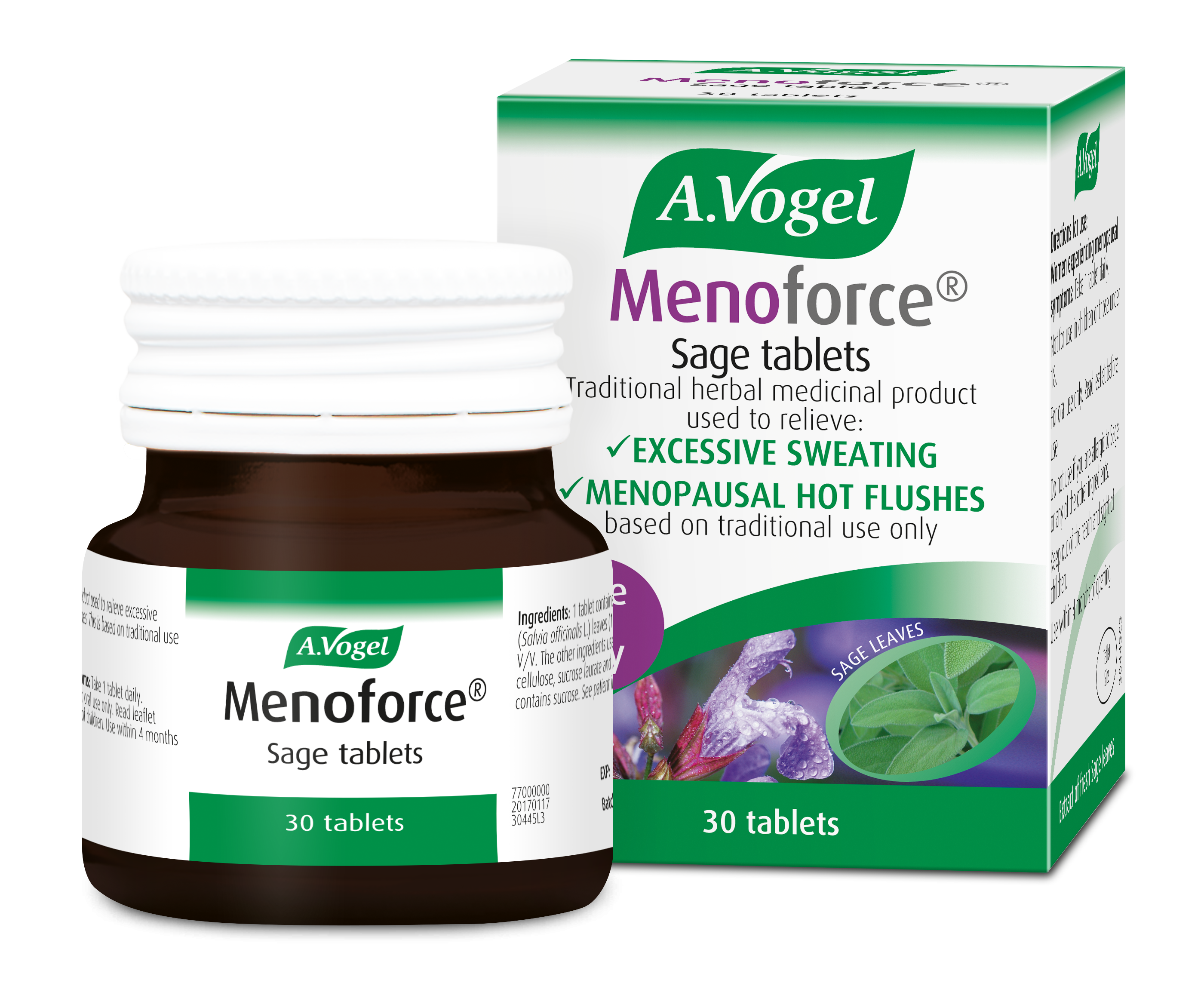Read the full video transcript below
Today's topic
Hello, and welcome to my weekly video blog. And today on A.Vogel Talks Menopause, I’m going to be talking about relaxation. And for those of you that have been following for a while, you know that this is something that I regularly recommend.
Firstly, hot flushes made the news recently…
But first of all, I want to talk a little bit about something that’s been happening in the news this week. Now, I love nature, and I love the fact that nature provides us with food, and medicines, and a lot of the herbal remedies that we use today have actually been handed down through the generations, because they really do work. One of our most popular remedies for the menopause is sage, and sage is known to help with hot flushes and night sweats. And research has shown that it actually works on a gland in the brain called the hypothalamus. Now, during the menopause, this gland, it can go a little bit offline, if you like, and this actually triggers your hot flushes and your night sweats. Now, here in the UK, this week in the papers, there’s an article that scientists have discovered or they’re formulating a new drug to actually work on hot flushes and night sweats.
Now, the great thing is this isn’t HRT, it is not a hormonal drug, but the downbeat is that it’s not going to be ready for at least five years, so that’s quite a long time to wait to treat your hot flushes. Now, for those of you out there that don’t realize it, we do have a remedy, a natural remedy, for hot flushes and night sweats, and that’s our own A.Vogel’s Menopause Sage tablets. So just to let you know about that.
A.Vogel Menoforce Sage Tablets for Menopausal Hot Flushes and Night Sweats, One-a-Day, 30 tablets
£15.99 (30 tablets) In Stock
Why relaxation is important
Now, to go back to relaxation, as I said before, this is something I recommend on a really regular basis, and it’s very, very important. And you’re probably sitting there, going, “Why? Why is relaxation so important?” In the menopause, the hormonal changes that go on inside your body are tremendous. Your body is using up an awful lot of energy, trying to keep itself in balance. And if other things are going on in your life externally, and for most of us that’s the case – we have busy lives; we have jobs; we have families; we may be looking after elderly parents or grandchildren or even still have children at home – so our days are very, very busy externally as well as internally.
And our body needs time to rest, to rebalance, and to recuperate, and unfortunately, sitting down with a cup of tea and watching the telly, or reading your favorite magazine, or having a little snooze is not really going to be enough. And we know that proper relaxation, so we’re talking about mindfulness or meditation or shutting yourself away and listening to nice music, actually alters your brain waves, and it’s been found in research that if you get the right set of brain wavelengths, that can actually have a profound effect on your nervous system.
It can calm your nervous system down very quickly, and the research has actually found that within less than a week, daily relaxation for 30 minutes had actually cut menopausal hot flushes and night sweats, so this is something that’s really fantastic. It doesn’t cost you anything but time, and this is probably one of the biggest bugbears, because so many women say to me, “I don’t have time.” But please try and make time for this, because it’s really important, and it can make a huge difference to your physical, emotional, and mental well-being as well.
How to fit some relaxation into your busy day
But I get a lot of women saying, “How do I do this? I’ve never done this before. I can’t sit and empty my mind. I don’t know how to meditate.” There’s a couple of things that you can actually do to get yourself started. Now, the first thing is that you need a routine, so you need to give yourself permission. Try to do it every day, if you can, to have 30 minutes to yourself. Have that very precious me time, and you do deserve it. You need the right sort of music. Now, this is going to be an individual choice. I love to listen to Sounds of Nature, and Whale Music, and things like that, but I couldn’t relax to that type of music.
For me, I need something more classical, I need slow melodic music or even the guided meditation, and I find that that works best for me. One of the best ways to find music is to go on to Amazon. You can check their relaxation CDs, and very often you can listen to them. You can also go on to YouTube as well. I actually found one of my most favorite pieces of relaxation music just by fettering about on YouTube. It does take a little bit of time, but it is worth it in the end. Your local health food shop may also have a range of relaxation CDs, so you can actually go in there and listen to them as well.
So that is the first thing: Pick a piece of music that will cheer you up, that will relax you, that will make you feel good, and you can sit and listen to it for 30 minutes. Secondly is to find a place to do this. Now, there’s no point in trying to meditate in the middle of the living room, while everyone else is running around, and they’re watching TV, and they’re talking. You need to shut yourself away somewhere quiet. Phone’s off, lock the door, if you can, tell anyone else in the house that they will disturb you at their peril. So make sure you get that 30 minutes of total peace and quiet.
Get comfortable
You need to be comfortable as well. So you could lie down on the bed. You could lie down on a mat on the floor. You could recline. I have one of those chairs that you can push out, and I just sort of lean back, and I can totally relax that way. I find that actually works best for me. You can get quite cold if you’re lying relaxing, so have a blanket, cover yourself with a blanket, just to make sure you’re nice and comfortable, and warm. There’s nothing worse than going halfway through your relaxation, and then suddenly starting to chitter, because you’re feeling the cold.
The other thing is don’t do this as you’re going to bed. Don’t do it in bed at nighttime. The reason being is that the brain waves that you go into when you sleep are not the same as the brain waves when you actually go into deep relaxation, so you will not get the same benefit if you fall asleep halfway through your 30 minutes.
Get into the mood to relax
So the next thing is to get into the mood for your relaxation, and if you’ve had a really busy day, and then you just suddenly plunked yourself down and put your headphones on, it’s going to take a while to get into the mood to do it. So I always find that I lie down, get myself really comfortable, and I’ll maybe do some deep breathing for a minute or two, just to get myself relaxed. And if you feel really tense, then you can actually work your way through your muscles and feel them relax before you actually start to do the relaxation, and then you just go for it.
Now, if you’ve never done it before, it can be really difficult, because even I have been doing a long time, and you can guarantee that some days I’ll be in it for a few minutes, and then suddenly your brain starts going, and you start thinking about what you’re going to do next.
Practise and don't give up
So it can take a lot of practice to just get to that stage where you’re very gently relaxed, but persevere, really keep going with it, because once you can reach that 30 minutes, you will find that it gives you such a lot of benefits, you feel so much better. I tend to do mine at night. Once I’ve had my dinner and cleared up, I’ll do half an hour’s relaxation around about 7 o’clock at night. And for me, it calms me down for the rest of the evening, I can have a nice relaxing evening, and it helps me to actually get to sleep better at night as well.
And you will find that once you start doing this relaxation, that if you miss it for more than a couple of days, you will really notice the difference, so try it and let me know you get on. So, I look forward to seeing you next week on A.Vogel Talks Menopause.









